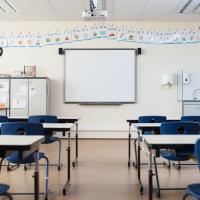Portugal: Number of Early Leaving form Education and Training Falls to Historic Low of 5.9% in 2021

After bettering the EU’s 10% target in 2020 with an impressive 8.9%, Portugal’s rate of early leaving from Education and Training fell even further in 2021, reaching an all-time low of 5.9%.
Over the last two decades, such positive figures have put Portugal top of the European improvement table. Between 2015 and 2021, the country’s dropout rate declined by over half, while the rest of the EU’s average percentage fell from 11% to 10%.
It is worth remembering that the early leaving rate from education and training has been the main development indicator for European educational systems, being recognised as key to economic competitiveness, social cohesion and equal opportunities in today's societies. This indicator tells us the percentage of young people not in school, education or training, which makes finding work more difficult.
These outcomes demonstrate the continuous effectiveness of programmes and measures that ensure educational success and better learning, in particular the National Programme for the Promotion of School Success (PNPSE). Others include an integrated approach to inclusive education, investment in wider choice, such as vocational education, and curricular autonomy and flexibility. The latter provides schools with the power to decide and adapt strategies, as well as implementing concrete student support measures, like specific tutorial support, Qualifica or projects encouraging multiple literacy, such as the National Reading Plan and School Libraries Network.
The joint efforts of schools and the Ministry of Education to ensure no student is left behind, particularly during the pandemic, is clearly demonstrated in this commitment to provide quality education for all. Portuguese schools have demonstrated great resilience, welcoming vulnerable children and young people, while adopting tools like #EstudoEmCasa (Home Study) and developing many of the 50-plus measures included in the "Plano 21|23 Escola+" learning recovery plan.
More information at:
https://www.portugal.gov.pt/pt/gc22/comunicacao/noticia?i=abandono-escolar-cai-para-menos-de-metade-em-seis-anos-
https://www.poch.portugal2020.pt/pt-pt/Noticias/Paginas/noticia.aspx?nid=907&ano=2021&pag=1&nr=10
Source: Eurydice Unit Portugal




